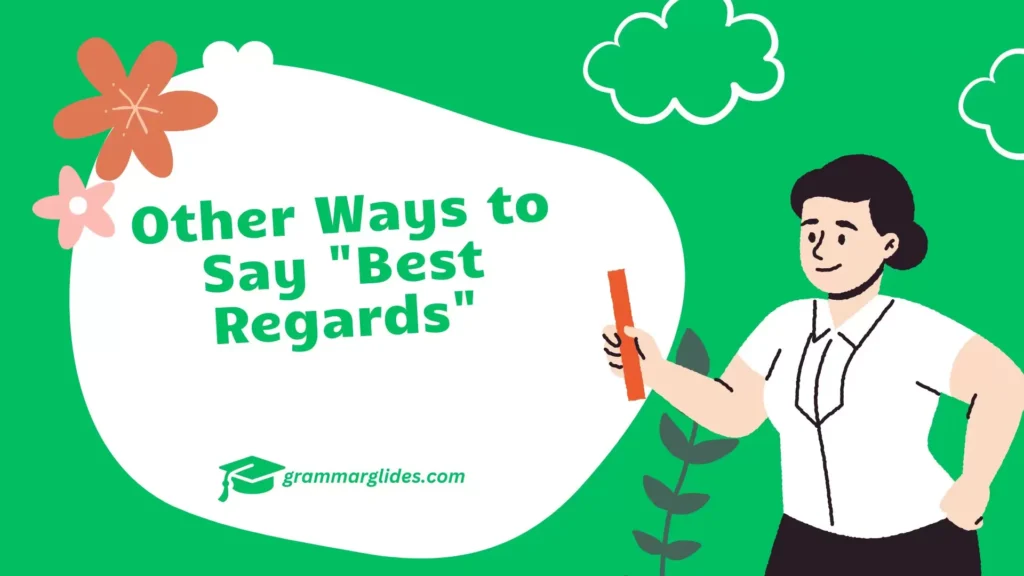When closing an email or letter, your sign-off sets the tone for the final impression. While “Best Regards” is a popular choice, exploring other alternatives can help convey your message more precisely and appropriately depending on the context.
1. “Sincerely”
Scenario: A formal closing used in professional and business communications.
Example 1: “Sincerely, Jane Smith”
Example 2: “Sincerely, John Doe”
Explanation: “Sincerely” is a classic and formal way to end a letter, indicating genuine intent and professionalism.
2. “Kind Regards”

Scenario: A polite and friendly closing suitable for both formal and informal contexts.
Example 1: “Kind regards, Emily Johnson”
Example 2: “Kind regards, Mark Thompson”
Explanation: “Kind Regards” conveys a warm and considerate tone, making it appropriate for most business and personal emails.
3. “Warm Regards”
Scenario: A closing that expresses a more personal touch while remaining professional.
Example 1: “Warm regards, Sarah Lee”
Example 2: “Warm regards, David Kim”
Explanation: “Warm Regards” is used when you want to convey friendliness and a personal connection.
4. “Best Wishes”
Scenario: A closing that offers good wishes, often used in personal or less formal business emails.
Example 1: “Best wishes, Jessica Brown”
Example 2: “Best wishes, Michael Davis”
Explanation: “Best Wishes” is a friendly and supportive closing that expresses hope for the recipient’s success or well-being.
5. “Regards”
Scenario: A neutral closing suitable for formal and informal communications.
Example 1: “Regards, Lisa Taylor”
Example 2: “Regards, James Wilson”
Explanation: “Regards” is a straightforward and versatile closing that fits many different contexts.
6. “Thank You”
Scenario: A closing used when you want to express gratitude.
Example 1: “Thank you, Anna Patel”
Example 2: “Thank you, Robert Garcia”
Explanation: “Thank You” is effective when you want to show appreciation or acknowledge something the recipient has done.
7. “With Appreciation”
Scenario: A formal closing that expresses gratitude and respect.
Example 1: “With appreciation, Laura Green”
Example 2: “With appreciation, Brian Adams”
Explanation: “With Appreciation” conveys a sense of gratitude and respect, suitable for professional settings.
8. “Cheers”
Scenario: An informal closing often used in casual or friendly emails.
Example 1: “Cheers, Tom Parker”
Example 2: “Cheers, Natalie Cole”
Explanation: “Cheers” is informal and friendly, suitable for less formal communications with colleagues or friends.
9. “Thanks Again”
Scenario: A closing used when you want to reiterate your thanks.
Example 1: “Thanks again, Olivia Mitchell”
Example 2: “Thanks again, Lucas Johnson”
Explanation: “Thanks Again” emphasizes your gratitude and is used when you want to reinforce your appreciation.
10. “All the Best”
Scenario: A warm and friendly closing suitable for both personal and professional emails.
Example 1: “All the best, Emily Adams”
Example 2: “All the best, Mark Lewis”
Explanation: “All the Best” conveys good wishes and a friendly tone, making it appropriate for various contexts.
11. “Yours Truly”
Scenario: A formal closing often used in business correspondence.
Example 1: “Yours truly, Charles Robinson”
Example 2: “Yours truly, Rachel Evans”
Explanation: “Yours Truly” is a traditional and formal way to close a letter, indicating sincerity and respect.
12. “Respectfully”
Scenario: A formal closing used when showing deference or respect.
Example 1: “Respectfully, Sandra Lee”
Example 2: “Respectfully, Alan Carter”
Explanation: “Respectfully” is used in formal contexts where you want to show respect or courtesy.
13. “In Appreciation”
Scenario: A closing that conveys thanks and acknowledges the recipient’s efforts.
Example 1: “In appreciation, Karen Adams”
Example 2: “In appreciation, Jason Clark”
Explanation: “In Appreciation” expresses gratitude and recognizes the recipient’s contributions or efforts.
14. “With Best Regards”
Scenario: A slightly more formal variation of “Best Regards.”
Example 1: “With best regards, Natalie King”
Example 2: “With best regards, Robert Wright”
Explanation: “With Best Regards” is a formal and polite closing that maintains a professional tone.
15. “Have a Great Day”
Scenario: An informal closing used in friendly or casual communications.
Example 1: “Have a great day, Jennifer Lopez”
Example 2: “Have a great day, David Smith”
Explanation: “Have a Great Day” is a friendly and casual way to end an email, wishing the recipient well.
16. “Take Care”
Scenario: An informal closing expressing well-wishes for the recipient’s well-being.
Example 1: “Take care, Laura Smith”
Example 2: “Take care, James Brown”
Explanation: “Take Care” conveys a personal touch and is suitable for casual or friendly emails.
17. “Best Regards and Thanks”
Scenario: Combining appreciation with a formal closing.
Example 1: “Best regards and thanks, Sarah Johnson”
Example 2: “Best regards and thanks, Michael Thompson”
Explanation: This closing combines gratitude with a formal tone, showing both respect and appreciation.
18. “With Warmest Regards”
Scenario: A slightly more personal variation of “Warm Regards.”
Example 1: “With warmest regards, Amanda Cook”
Example 2: “With warmest regards, Tom Mitchell”
Explanation: “With Warmest Regards” adds a touch of personal warmth and friendliness to your closing.
19. “Cordially”
Scenario: A formal and polite closing often used in business communications.
Example 1: “Cordially, Lisa Adams”
Example 2: “Cordially, James Lee”
Explanation: “Cordially” is a formal closing that indicates politeness and professionalism.
20. “Best”
Scenario: A brief and neutral closing suitable for various contexts.
Example 1: “Best, Julia White”
Example 2: “Best, Brian Harris”
Explanation: “Best” is a concise and neutral closing that works in both formal and informal settings.
21. “In Closing”
Scenario: A formal closing used to summarize or conclude a message.
Example 1: “In closing, Mary Johnson”
Example 2: “In closing, Robert Taylor”
Explanation: “In Closing” is used to signal the end of a letter or email, often leading into a summary or final thoughts.
Other Ways to Say “Moving Forward”
22. “Until Next Time”
Scenario: A friendly closing suggesting future communication.
Example 1: “Until next time, Emily Carter”
Example 2: “Until next time, Mark Anderson”
Explanation: “Until Next Time” implies an ongoing relationship and the expectation of future interactions.
23. “Best of Luck”
Scenario: Wishing success or good fortune to the recipient.
Example 1: “Best of luck, Natalie Green”
Example 2: “Best of luck, David Martin”
Explanation: “Best of Luck” is a supportive closing used when wishing the recipient success in their endeavors.
24. “Looking Forward”
Scenario: Indicating anticipation for future correspondence or meetings.
Example 1: “Looking forward, Jessica Taylor”
Example 2: “Looking forward, Michael Young”
Explanation: “Looking Forward” expresses eagerness or anticipation for future interactions.
25. “Thanks for Your Attention”
Scenario: Expressing gratitude for the recipient’s consideration.
Example 1: “Thanks for your attention, Karen Wilson”
Example 2: “Thanks for your attention, Tom Scott”
Explanation: This closing acknowledges the recipient’s time and consideration.
26. “With Gratitude”
Scenario: Showing appreciation and thanks at the end of a communication.
Example 1: “With gratitude, Alice Brown”
Example 2: “With gratitude, John Green”
Explanation: “With Gratitude” conveys a sense of deep appreciation and thanks.
27. “Thanks for Your Support”
Scenario: Acknowledging the recipient’s help or support.
Example 1: “Thanks for your support, Laura Thompson”
Example 2: “Thanks for your support, Michael Clark”
Explanation: This closing thanks the recipient for their support and assistance.
28. “Warmest Wishes”

Scenario: A friendly and warm closing suitable for personal and professional messages.
Example 1: “Warmest wishes, Emily Roberts”
Example 2: “Warmest wishes, James Walker”
Explanation: “Warmest Wishes” conveys a friendly and caring tone, suitable for various contexts.
29. “Until We Meet Again”
Scenario: A warm and personal closing suggesting future meetings.
Example 1: “Until we meet again, Sarah Collins”
Example 2: “Until we meet again, David Martinez”
Explanation: This closing implies a personal touch and the anticipation of future interactions.
30. “Yours Faithfully”
Scenario: A formal closing used in situations where the recipient is unknown.
Example 1: “Yours faithfully, Emma Lewis”
Example 2: “Yours faithfully, Daniel Wilson”
Explanation: “Yours Faithfully” is used in formal correspondence, particularly when the recipient’s name is unknown.
Conclusion
Exploring alternatives to “Best Regards” allows you to tailor your email or letter closing to better suit the context and relationship with the recipient.
Whether you aim for formality, warmth, or a personal touch, these variations help convey your message effectively and leave a positive final impression.

Hi! I’m Lauren Reynolds, the author of Grammar Glides. I create easy-to-follow content that helps you master English with confidence. Let’s make learning English simple and enjoyable together!

